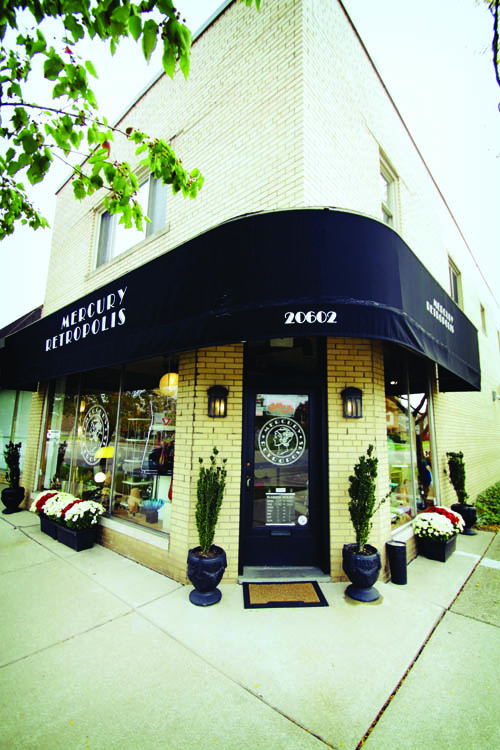 It’s not unusual in our increasingly digitally based business world to witness the closing of another bricks-and-mortar shop so the owners can switch to online sales.
It’s not unusual in our increasingly digitally based business world to witness the closing of another bricks-and-mortar shop so the owners can switch to online sales.
But it is unusual to go the opposite route: Quit selling online and open an actual store.
That’s just what Jenna Mullins and Michelle Winstanley did last April when they opened Mercury Retropolis, a sleek shop dedicated to midcentury design and contemporary art. “From Deco to Disco” is its credo.
“Freight prices are really escalating now, and we found that things pretty much doubled after last year,” Mullins says. “That’s what kind of stopped us from doing eBay … it became prohibitive to ship certain things, especially larger items like furniture.”
But there was another good reason for opening the store — a desire for establishing human interaction with customers.
“There’s nothing social about selling online at all,” Mullins says. “People are losing their connections to other human beings. It’s really sad because we’re starting as a society to get a complete disconnect with other people.”
That social link also allows the proprietors to instill in clients an enthusiasm for collecting.
“We want this store not just to be a place where you can buy cool stuff, but to be in an environment where we help people identify things,” Winstanley says. “We’ve had people who come in who have no idea what vintage Blenko or Murano glass is. So we explain to them what they’re buying. They go home and do research and get a fever about collecting.”
 And “cool stuff” it is. The store during a recent visit looked like the storage area for Mad Men props. There were such midcentury finds as a Baumritter sofa, love seat, and chair; sling chairs designed by Charles Pollock; a metal screen by industrial designer Frederick Weinberg; a clamshell chair by J.L. Chase; a stash of drawings by Hy Vogel, the resident caricaturist at the old London Chop House downtown; photographs by Leni Sinclair of blues greats B.B. King and John Lee Hooker; and a circa-1968 lime-green poster touting that the bands Solo Society and the Free would be appearing at Livonia’s Ladywood High School. Also for sale are new messenger and laptop bags produced by the Detroit Urban Design Studio featuring designs by Gary Grimshaw and other Detroit artists.
And “cool stuff” it is. The store during a recent visit looked like the storage area for Mad Men props. There were such midcentury finds as a Baumritter sofa, love seat, and chair; sling chairs designed by Charles Pollock; a metal screen by industrial designer Frederick Weinberg; a clamshell chair by J.L. Chase; a stash of drawings by Hy Vogel, the resident caricaturist at the old London Chop House downtown; photographs by Leni Sinclair of blues greats B.B. King and John Lee Hooker; and a circa-1968 lime-green poster touting that the bands Solo Society and the Free would be appearing at Livonia’s Ladywood High School. Also for sale are new messenger and laptop bags produced by the Detroit Urban Design Studio featuring designs by Gary Grimshaw and other Detroit artists.
Although midcentury furnishings are hot sellers, Winstanley says customers often tell her that Mercury Retropolis’ prices are about 40 percent lower than what’s online or in other area shops.
The owners scour estate sales and auctions in addition to buying from people who invite them into their homes. Both have trained eyes to spot quality art, furniture, and other accessories.
Winstanley, a Milford native, recalls as a youngster going to innumerable estate sales with her mother, and her father ran a seasonal resale shop in northern Michigan. Mullins, a native east-side Detroiter, spent countless hours at the DIA and the Cleveland Museum of Art.


With its funky vibe and vintage merchandise, one might expect Mercury Retropolis to be located in trendy Ferndale, Royal Oak, or Midtown Detroit.
It’s not. Housed in a 1940s-era building on Harper Avenue (the I-94 service drive) just south of Vernier Road, Mercury Retropolis is in decidedly untrendy Harper Woods, where Mullins and Winstanley live.
“We were going for a walk and saw this vacant building, and when we got inside, we were like, ‘Wow!’ ” Winstanley says. “There were tin ceilings and other nice architectural details.
“It was perfect and already set up like a gallery because of the individual rooms.”
But she adds that the edifice, which had been a spa in front and a cookie factory in the rear, was in need of some work.
 The proprietors enlisted the help of friend Carl Lundgren to redesign the gallery. Lundgren’s name should ring a bell with Detroiters of a certain age. Along with Grimshaw, he created memorable psychedelic posters promoting appearances by bands at the Grande Ballroom. He went on to become a sci-fi/fantasy illustrator, then shifted to fine art.
The proprietors enlisted the help of friend Carl Lundgren to redesign the gallery. Lundgren’s name should ring a bell with Detroiters of a certain age. Along with Grimshaw, he created memorable psychedelic posters promoting appearances by bands at the Grande Ballroom. He went on to become a sci-fi/fantasy illustrator, then shifted to fine art.
In June, Lundgren and his photographer wife, Michele, shared an exhibition of their work at Mercury Retropolis in an area of the building that’s called the Art Annex.
Mullins and Winstanley hope to persuade Leni Sinclair (ex-wife of 1960s radical John Sinclair) to agree to a solo show of her previously unpublished photos of classic rockers, from the Rolling Stones to Iggy Pop — possibly as early as January.
The owners are as colorfully offbeat in their private lives as the merchandise they sell. Mullins, who is transgender, is the vocalist in the punk band Glitter Trash. Winstanley, a devotee of punk music, met Mullins (whose stage name is Jenna Talia) during a Glitter Trash gig at a Detroit bar. Love bloomed, and now the two are life partners as well as business partners. They share their home with two spirited Chinese crested dogs, Kelei and Cuckoo.
Winstanley says she and Mullins chose the name Mercury Retropolis for a few reasons. “I’m a Gemini, so Mercury is my ruling planet, and Mercury is also the god of commerce. Plus, the logo for Glitter Trash is the Liberty, or Mercury, dime.”
Mercury is also the winged messenger of the gods, and Mullins and Winstanley no doubt hope he’ll help spread the message about their hidden treasure of a shop.
20602 Harper Ave. (eastbound I-94 service drive), Harper Woods; 313-640-4811
facebook.com/mercuryretropolis.
Wed.-Sat. 11 a.m.-7 p.m. and noon-5 p.m. Sun.
|
|
|









